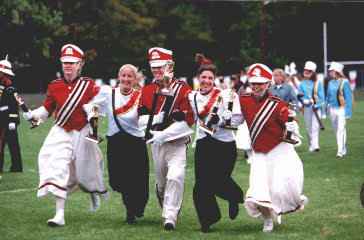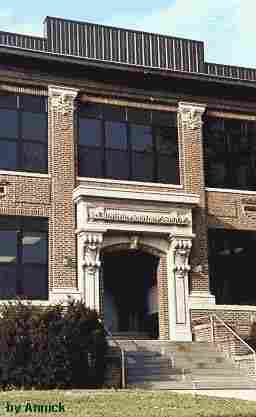 on Flemington-nj.com |

In 1893 the citizens of Flemington voted in a town meeting at Reading Academy for free textbooks and supplies to be paid by taxation. The issue was apparently a debatable one, for the local editor in reporting the event at the time footnoted, "Let's give free books a fair trial". Men and women who settled in Hunterdon County in the early 1700's came from diverse backgrounds. With most there was a deep religious faith which influenced their thoughts and actions. What these people chose to teach their children varied with the settler's origin. The state of New Jersey took spasmodic interest in the public education field from the time of its first effort. The first financial assistance came in 1817. In 1820 local governments were authorized to raise money by taxation to provide education to paupers and children of the poor according to the judgment of the school committee. The last day of school was usually a festive occasion and the type of festivity was a sign of the times. A report of the Spring Hill school in Kingwood Township disclosed that in 1825 Benjamin Dennis taught there and as was customary at the end of the quarter the last day of school required a treat from the teacher of eggnog, or wine for the older boys. It was during the last century that our schools became free to all students, compulsory attendance started, teacher qualification and certification conformed to rigid standards, textbooks and instructional materials were supplied to all students, and curricula to include vocational as well as academic subject matter were offered. ©1997- Annick Elzière |
|
In
the News (Oct.
2000)
Dwight Allen, Cosby will co-author book on educational reform. As the dean of the School of Education at the University of Massachusetts at Amherst, Dwight W. Allen developed innovative programs, positioned the school as a research leader and recruited numerous nontraditional graduate students, including a young comedian named Bill Cosby. The two have stayed in touch over the years, and it was announced this week that Allen, eminent professor of educational reform at Old Dominion, and Cosby will collaborate on a new book about educational reform. The working title is "Making a Difference in Education: Try Money." Making changes in education is both hard and expensive, Allen declares. In the book, he and Cosby will point out how foolish it is not to invest 5 to 10 percent of the cost of education in systematic experimentation. FOR MORE INFO ON THE BOOK VISIT VISIT http://web.odu.edu/ao/instadv/archive/issue18/dallen.htm |
|
|
Welcome to the Hunterdon County Educational Services Commission offering many services such as Alternative Schooling, Special Education, Therapeutic Riding Program, Bus Transportation, Technology Services, Adult & Continuing Education - For more information send email to [email protected] or write to: Network Specialist, Hunterdon County ESC, 215 Route 31, Flemington, NJ 08822 - Phone: (908) 806-2729 - Visit: http://www.hcesc.com/ |
|
|
New
York Academy of Sciences:
What's New ?
|
|
|
|
|
|
|
|
|
|
|
|
ELEMENTARY
EDUCATION
in Hunterdon County in its early days took place in a one room school house constructed by residents of its vicinity to accommodate the school master who "traveled around" and contracted with parents to instruct in the common branches of knowledge at a nominal charge per semester, per child. During the last century while Flemington National Bank was helping school officials with their expanding financial needs vast changes came to the public education field including compulsory attendance, free tuition, free text books and supplies, required training and certification of teachers, consolidation of one room school's and arrangement of schools along municipal rather than district lines. The Flemington elementary school's first 4 rooms were built in 1900. Added in 1910. In 1908 Flemington completed its 12 room Elementary School. It served until disastrous fire of March 23, 1954 which completely destroyed the building. New teaching methods and better equipment made school more fun for the Flemington children of the early '30's. The only district to combine on elementary level have been Flemington Borough and Raritan Township, which first consolidated in 1948 then regionalized for purposes of receiving additional state aid in 1961. |
|
|
|
|
HUNTERDON
CENTRAL REGIONAL HIGH SCHOOL
Board makes plans for merging the educational interests of five municipalities in building a new High School to open in 1956. In 1954, Delaware, East Amwell, Raritan and Readington Townships and Flemington Borough made up the Hunterdon Central High School District. Fleets of big yellow school buses carry the majority of Hunterdon's students to public school, a far cry from horse-drawn vehicles or converted trucks. It's reached the state where schedules are computerized. The passing of the neighborhood one-room school brought the new era of transportation. |
|
|
Flemington
Elementary
Schools |
|
|
Flemington
Middle School |
|
|
Flemington
Central
Regional High School: |
|
|
Hunterdon
County Polytech http://www.co.hunterdon.nj.us/polytech/polytech.htm |
|
 |
|
|
Hunterdon Drug Awareness Program: 908-788-1900
AIDS Network: 1-800-262-0733 ALCOHOLICS ANONYMOUS: 908-668-1882 COCAINE HELPLINE: 1-800-262-2463 CHILD ABUSE HOTLINE: 1-800-792-8610 DEAF HEARING IMPAIRED: 1-800-792-8339 HELPLINE: 1-800-792-8600 NARCOTIC ANONYMOUS: 1-800-992-0401 NEW JERSEY DRUG HOTLINE: 1-800-225-0196 FRIENDSHIP PREGNANCY CENTER: 908-806-4444 SUICIDE HOTLINE: 1-800-272-4630 SEXAHOLICS ANONYMOUS: 1-805-581-3343 YOUTH SHELTER: 908-782-0848 or 782-1046 WOMEN'S HOTLINE: 1-800-322-8092 WOMEN'S CRISIS SERVICES: 908-788-4044 Various drug abuse prevention materials, including The Parent's Guide to Drug Prevention, Growing Up Drug Free, and schools Without Drugs can be obtained by calling 1-800-624-0100. In D.C., the number is (202) 260-3954. |
|
 |
|
|
HUNTERDON CENTRAL REGIONAL HIGH SCHOOL Highway 31, Flemington (908) 782-5727 NORTH HUNTERDON REGIONAL HIGH SCHOOL Highway 31,Annandale (908) 735-5191 -Dr. Linda Palumbo, Principal VOORHEES HIGHT SCHOOL 256 Route 513, Glen Gardner (908) 638-6116 - Mr. Robert Gratz, Principal SOUTH HUNTERDON REGIONAL HIGH SCHOOL 301 Mount Airy-Harbourton Rd. Lambertville (609) 397-1311 Dr. Thomas Davidson, Superintendent DELAWARE VALLEY REGIONAL HIGH SCHOOL 19 Senator Stout Road, Frenchtown, NJ 08825 908-996-6710 Fax: 996-4527 - Mr. Martin J. Matula, Ed. D., Superintendent |
|
|
|
|
|
|
|
|
|
|
|
GOING
TO COLLEGE
|
|
|
The
Department of Education provides information about how to apply for
federal student aid through
a toll-free number, 1-800-4FEDAID (1-800-433-3243). If the student has already filed a Free Application for Federal Student Aid, he or she can check the status of the application by calling (319) 337-5665 - Complete your application for federal student aid (FAFSA) online. |
|
| FINANCIAL AID: http://www.finaid.org/ | |
| This
is the Web site for the online version of CSS/Financial
Aid PROFILE the fast, easy, convenient, secure way to apply for financial aid for the 2001-2002 school year. |
|
| SELECT A COLLEGE: http://moneycentral.msn.com/articles/family/find/contents.asp?p=2 | |
| TUITION SAVINGS CALCULATOR: http://moneycentral.msn.com/investor/calcs/n_college/main.asp | |
| COLLEGE SEARCH: http://www.fastweb.com/cpt/college/search-names.ptml | |
|
|
|
Like
more information on Colleges, go to
|
|
 © 10/98 - Photo by Rob Quinlan of Highwing The photo was taken after a recent band competition held in Ridgewood, N.J. (Oct. 4) The Hunterdon Central Marching Band won 5 major awards (best music, best marching, colorguard, percussion, 1st place). |
|
|
Preventing
Violence in Schools Through the Production of Docile Bodies
By
Pedro Noguera, Ph.D. Berkeley,
California To effectively address the problem of violence in schools I believe we must begin by asking ourselves why schools are vulnerable to the occurrence of violence. What is there about the structure and culture of schools which has in recent times increased the likelihood that acts of violence will be perpetrated there? It may be that in a relative sense young people are in fact far safer in school than they are in their neighborhoods, or for that matter at the park, the roller rink or even their home.(11) For many parents and students the fact that schools are "relatively safe" provides little solace given the widespread expectation that schools are supposed to be safe, and therefore should not be judged on the same standard that we use to gauge security in other public or even private places. Schools are "controlled institutions", public spaces where individuals sacrifice a measure of individual liberty in exchange for the opportunity to learn. In such a setting the threat of violence constitutes more than just a threat to personal safety. It represents a fundamental violation of the social contract between school and community; an abrogation which could easily hasten the collapse of popular support for public education. |
|
|
The Role of Teachers While police officers, security guards and administrators generally assume primary responsibility for managing and enforcing school discipline, in most cases, teachers make the first referral in the discipline process, and therefore have tremendous influence in determining who receives discipline and why. In my work with urban schools, the most frequent concern I hear from teachers is that they have trouble disciplining and controlling their students. This has been especially true in schools at which the majority of students are Black and the majority of teachers are White. Having taught before in urban public schools, I am quite familiar with what teachers are up against, and recognize that some semblance of order and safety is essential if teaching and learning is to take place. However, whenever I conduct workshops in schools I generally try to shift the focus of talk about discipline to discussion about what teachers know about their students. I do this because I have generally found that teachers who lack familiarity with their students are more likely to misunderstand and fear them. A teacher who fears the student that s/he teaches is more likely to resort to some form of discipline when challenged, or to ignore the challenge in the hope that s/he will be left alone. Rather than handling a classroom disruption on their own, they are more likely to request assistance from those responsible for handling discipline. Likewise, students who know that their teachers fear them are less likely to show respect, and more likely to be insolent and insubordinate. When fear is at the center of student-teacher interactions, teaching becomes almost impossible, and concerns about safety and control take precedent over concerns about teaching.Efforts such as these are effective at addressing the potential for violence because they are based on the assumption that students will respond favorably to humane treatment. I believe that there are a variety of ways in which to humanize school environments and thereby reduce the potential for violence. By improving the aesthetic character of schools by including art in the design of schools, or by making space available within schools for students to create gardens or greenhouses, schools can become more pleasant and attractive. Similarly, by overcoming the divide that separates urban schools from the communities in which schools are located, the shortage of figures who possess "moral authority" in the eyes of children can be addressed by encouraging adults who live within the community to volunteer, or if possible, to be paid to tutor, teach, mentor, coach, perform or just plain help out with a variety of school activities. There are undoubtedly a variety of ways in which this can be done, and while such efforts may not eliminate the threat of random violence, they can help to make schools safer, less impersonal and better able to provide students in need with a sense of stability in their lives. -Dr. Pedro Antonio Noguera is a professor of education at the University of California, Berkeley. |
|
|
|
|
|
|
|
|
|
|

